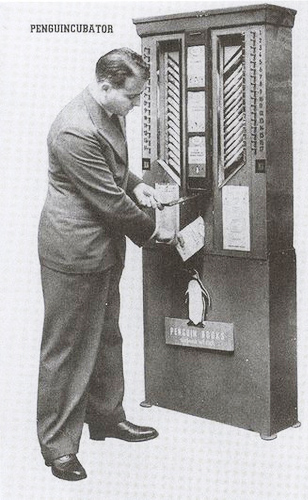John J. Geoghegan: A Brief History of Book Vending Machines
There are lots of reasons why a white elephant technology doesn't catch on. Sometimes the technology is ahead of its time. In other cases, no amount of time can make a misguided technology useful or attractive.
Then there's vending machines that sell books.
The first book-dispensing vending machine was built by Richard Carlile in England in 1822. Carlile was a bookseller who wanted to sell seditious works like Paine's Age of Reason without being thrown in jail. His answer was a self service machine that allowed customers to buy questionable books without ever coming into contact with Carlile. The customer turned a dial on the devise to the publication he wanted, deposited his money, and the material dropped down in front of him. It's unclear whether this was an automated process, but that didn't stop England's own automated process from convicting one of Carlile's employees for selling "blasphemous material."
The Penguincubator
The next book-dispensing machine was the Penguincubator, which appeared in London in 1937. Conceived by Allen Lane, the founder of Penguin Books, the Penguincubator dispensed classic literature in paperback form for about the same price as a pack of cigarettes (see photo below).

Lane was an iconoclastic figure in British publishing. Credited with popularizing high-quality, mass-market paperbacks, he was viewed as a radical intent on destabalizing the book industry. According to Penguin's website, the Penguincubator's origin story goes something like this:
After a weekend visiting Agatha Christie in Devon, Allen Lane found himself on a platform at Exeter station searching its bookstall for something to read on his journey back to London.... Appalled by the selection, Lane decided that good quality contemporary fiction should be made available at an attractive price and sold not just in traditional bookshops, but also in railway stations, tobacconists and chain stores.
Some reports suggest the Penguincubator was apocryphal, but it appears at least one was installed near Charing Cross Station in London much to the consternation of local booksellers.
Sir Allen may have succeeded in changing English reading habits, but the Penguincubator had little to do with it. Specifically, it was never manufactured in sufficient quantity to make an impact on the market, but that didn't stop others from expanding upon the idea....